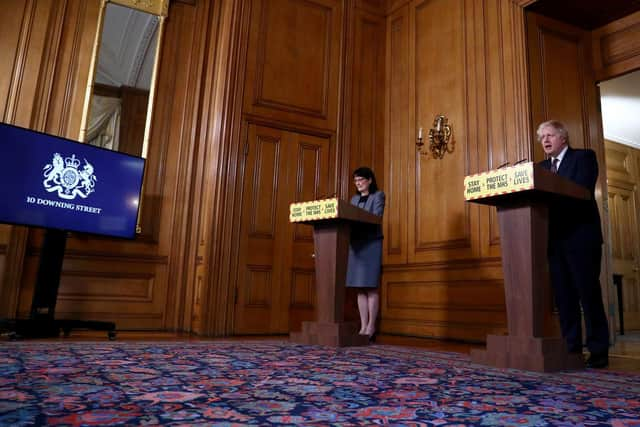Coronavirus still putting 'substantial strain' on NHS as children head back to school
England’s deputy chief medical officer Dr Jenny Harries gave the warning today as schools reopened for pupils across the country and people were allowed to meet one-on-one for the first time in months.
Prime Minister Boris Johnson said he accepted case rates were likely to rise with pupils returning to classrooms physically.
Advertisement
Hide AdAdvertisement
Hide AdHe said: “There will be a risk of increased transmission, that's inevitable. If you open up schools for millions of kids across the country that is going to happen.”


But he said due to progress on vaccinations it was “prudent” to be able to open schools now.
And Dr Harries added it was unlikely schools would have to close again.
“I think we can be very optimistic going forward,” she said.
Advertisement
Hide AdAdvertisement
Hide Ad“The testing programme in schools should mean that the likelihood of a case going into a school and then numbers of children having to come out of education to isolate should be very significantly reduced.
“There may be a very short period at the start of this programme where everybody gets used to it and a larger number of children come out of school and then it will settle down.
“It is really important when observing this that people think through the next three to four weeks, not the first one or two.”
And she said schools will be “inherently safer places” due to increased testing.
She said:: “We do expect there to be an impact on R.
Advertisement
Hide AdAdvertisement
Hide Ad“What we do know is, or at least we can’t disentangle, the social interaction element of that rise in R. So, it’s just as likely it’s people meeting at school gates, or the different numbers of social interactions, as much as it is in schools.
“I think the critical point is there are new interventions, so the testing for schools is in place, starting from now and gradually for some senior pupils going forward.
“What that is likely to do is diminish the number of community transmission cases which could come into schools, so schools will be inherently safer places, but equally it will reach back into families.
“So although I suspect we may see a rise at the start, with luck as we go forward and people get used to using that testing whole families will be protected as well.”
Advertisement
Hide AdAdvertisement
Hide AdBut Dr Harries said levels of hospitalisation from the virus was still high and added: “This is still a substantial strain on the NHS and not one that we can afford to rise from again with further pandemic waves.”
And Mr Johnson referenced this when asked whether he would consider speeding up the easing of lockdown.
“Of course I understand the urgency that people feel but we have to be driven by the data, we have to look at the rates of infection,” he said.
“Don’t forget they are still very high by the standards of last year – we still have thousands of people in hospital with Covid.
Advertisement
Hide AdAdvertisement
Hide Ad“We have seen, alas, in other European countries that the curve is going up again and we remember frankly what happened every time we’ve seen those upwards curves in our friends and neighbours that it is not too long after that that we see an increase in this country as well.
“We’ve just got to remain prudent and the whole point about this road map is it is intended to be cautious but irreversible and we think we can do that because of the success of the vaccine rollout.
“I think people would really rather trade some urgency and some haste in favour of security and certainty about those dates that we have set out.”